
- •Страдательный залог (the passive voice) *
- •Неличные формы глагола
- •Образование и использование неличных форм глагола
- •Глаголы/выражения, требующие после себя герундия
- •Предлог (the preposition)
- •Пространственные предлоги направления/движения/места*. Предлоги, выполняющие грамматическую функцию
- •Предлоги времени
- •Составные предлоги
- •Наиболее употребительные выражения с предлогами
- •Тексты для работы по теме «социальная работа»
- •Тема 1. Social Work abroad
- •Тема 2. Social Work in Russia
- •Тема 3. Social Worker
-
Страдательный залог (the passive voice) *
|
Временные формы глагола в страдательном залоге употребляются по тем же правилам, что и в действительном залоге: Indefinite/Perfect (Present, Past, Future. NB.! Имеются только две формы Continuous (Present, Past) Основная формулa to be + Participle II |
|||
|
Система настоящих времен (Present Tenses)
|
Характер действия |
||
|
Факт Основная формула to be + Participle II |
Процесс Основная формула to be + being + Participle II |
Результат Основная формула to have + been + Participle II |
|
|
Present Indefinite Tense Основная формула am / is /are + Participle II* |
Present Continuous Tense Основная формула am / is / are + being + Participle II |
Present Perfect Tense Основная формула have / has + been + Participle II |
|
|
e.g. I am asked. Меня спрашивают. (постоянно) |
e.g. I am being asked. Меня спрашивают. (сейчас) |
e.g. I have been asked. Меня спросили. (уже сегодня) |
|
|
Система прошедших времен (Past Tenses)
|
Past Indefinite Tense Основная формула was / were + Participle II |
Past Continuous Tense Основная формула was / were + being + Participle II |
Past Perfect Tense Основная формула had + been + been Participle II |
|
e.g. I was asked at 6 o’clock Меня спросили в 6 часов. (вчера) |
e.g. I was being asked. Меня спрашивали. (вчера/в течение какого-то периода времени) |
e.g. I had been asked. Меня спросили. (вчера/до наступления дру-гого действия в прошлом) |
|
|
Система будущих времен (Future Tenses)
|
Future Indefinite Tense Основная формула shall/will be + Participle II |
Future Continuous Tense – |
Future Perfect Tense Основная формула shall / will +have been+ Participle II |
|
e.g. I shall be asked. Меня спросят. (завтра) |
– |
e.g. I shall have been asked. Меня спросят. (завтра/до наступления другого действия) |
|
|
N.B.! Глагол в форме страдательного залога переводится на русский язык: 1. формой глагола в страдательном залоге: e.g. St. Paul’s Cathedral, the largest protestant church in England, was built in 1710. Собор Св. Павла, самая большая протестантская церковь Англии, (был) построен в 1710 году. 2. формой возвратных глаголов на – сь/– ся. e.g. Westminster Abbey*** is visited by millions of tourists annually. Вестминстерское Аббатство посещается миллионами туристов ежегодно. |
|||
*Залог – это форма глагола, которая показывает, является ли подлежащее исполнителем действия (действительный залог) или испытывает на себе действие со стороны другого лица или предмета (страдательный залог), которые часто неизвестны или вводятся предлогами by (для одушевленных лиц) и with (для неодушевленных лиц):
e.g. The novel «The Picture of Dorian Gray» was written by George Bernard Shaw.
Роман «Портрет Дориана Грея» был написан Джорджем Бернардом Шоу.
** См. Раздел VII Приложение 1 «Основные формы неправильных знаменательных смысловых глаголов»
*** См.: Раздел VI Глоссарий «Социокультурной портрет Великобритании»
Упражнение
41.
Выберите
формы глагола в страдательном залоге,
которые не могут быть использованы в
предложениях, приведенных ниже:![]()
-
These roses in the garden … three times a week.
-
you should pour b) can be poured c) should be poured
-
The foreign students … many questions about the history of the British.
-
won't be asked b) didn't be asked c) weren't be asked
-
As he does not know English table manners, he … about them.
-
must be informed b) will be informed c) was informed
-
The logs … too long for the fireplace. (usually)
-
were cut b) are being cut c) are cut
-
-
Admiral Nelson* … in sea battle against the French Flee in 1805.
-
will be badly wounded b) was badly wounded c) had been badly wounded
-
The book «Oliver Twist» after Ch. Dickens* … everywhere as a rule.
-
is looked for b) is being looked for c) was looked for
-
Oliver Twist* … at in his childhood.
-
was laughed b) had been laughed c) will be laughed
-
Nora … with the housework.
-
is helped b) will help c) won't be helped
-
The picture «The Hay Wain»* … by John Constable.
-
can be painted b) painted c) was painted
-
Vivien Leigh* … by the Oscar Prize for the film «Gone with the wind».
a) was nominated b) had been nominated c) will be nominated
________________________________________________________________________________
* См.: Раздел VI Глоссарий «Социокультурной портрет Великобритании»
Упражнение
42.
Заполните пропуски в тексте подходящими
по смыслу грамматическими формами
глаголов в страдательном залоге: ![]()

Emblems 1
as a simple way of identifying countries, companies, organizations in
the UK. Each country of the UK has its own Patron Saint and a floral
national emblem, as well as its own flag. A red rose 2
England’s national emblem. Roses 3
as emblems during the Wars of the Roses, civil wars (1455-1485)
between the Royal House of Lancaster (whose emblem was a red rose)
and the Royal House of York (whose emblem was a white rose).
Afterwards, they organized the Tudor
Rose.
Originally the Tudor Rose introduced by Henry III was a symbol of the
Tudor family when its members were the kings and queens of England
(1485-1603). Other emblems include a bulldog often wearing a Union
Jack waistcoat – John Bull, an old fashioned
fat
country gentlemаn.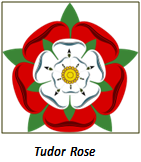
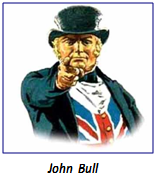
Two plants,
the
leek
and the
daffodil*
4
as
national emblems of Wales. On the first of March each year one can
see people walking around London with leeks and daffodils pinned to
their coats. The Welsh put them into the hole button on the 1st
of March, a holiday in honour of the Saint of Wales. St. David was an
abbot and became the Saint Patron of Wales in the sixth century. The
name «David» is equivalent to the Saint’s Welsh name «Dewi».
This Saint was known traditionally as a «Waterman», which means
that he and his monks were teetotallers. A teetotaler is someone who
drinks no alcohol.
The
vegetable called
leek
is also considered to be a traditional emblem of Wales.
There
are many explanations of how the leek came to be adopted as the
national emblem of Wales. One is that St. David advised the Welsh, on
the eve of battle with the Saxons, to wear leeks in their caps to
distinguish friends from enemies. 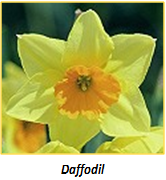
The
thistle*,
a prickly-leaved purple flower, 5
as a national emblem of Scotland not by chance. People used in the
XVIIIth
century as a symbol of Defense.
The
answer can 6
in
the history of the country. The thorn
7
by the people of Scotland many years ago, because it had saved their
land from invaders. The legend says that during the surprise night
attack by the invaders the Scottish soldiers 8
by the shouts of the invaders as their bare feet touched the thorns
of the thistles in the field they were crossing. This is a good
reason to choose the thistle as a national emblem! The thistle is an
official emblem, but a tartan pattern 9
on
many Scottish products.
The Scottish bluebell
is also seen as the flower of Scotland.
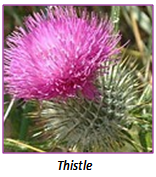
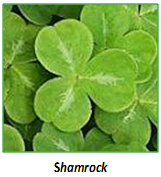
The national flower of Northern Ireland is the shamrock*, a three-leaved plant similar to clover. An Irish tale tells of how Patrick used the three-leaved shamrock to explain the Trinity. He used its sermons to represent how the Father, the Son, and the Holy Spirit could all exist as separate elements of the same entity. His followers adopted the custom of wearing a shamrock on his feast day. The shamrock and the harp 10 with the Republic of Ireland.
________________________________________________________________________________
* См.: Раздел VI Глоссарий «Социокультурной портрет Великобритании»
The Tudor Rose Роза Тюдоров
А
waistcoat жилетка
A shamrock [‘ʃæmrɒk] трилистник, разновидность клевера
A leek лук-порей
A daffodil [‘dæfədil] нарцисс
Оne can see people walking around London with leeks and daffodils pinned to their coats Можно встретить людей в Лондоне с луком-пореем и нарциссами, пришпиленными к одежде.
A thistle [θisl] чертополох
А symbol of Defense символ защиты
А thorn чертополох/колючка/шип
А surprise night attack внезапное ночное нападение
A monk [mɒŋk] монах
A teetotaler [,ti:’təυt(ə)lə] трезвенник
A clover [’kləυvə] клевер
The Trinity [‘triniti] Святая Троица
He
used its sermons to represent how the Father, the Son, and the Holy
Spirit could all exist as separate elements of the same entity.
Он использовал его семена, чтобы
объяснить единство Сына, Отца и Святого
Духа, как они все существуют как отдельные
элементы одного целого. 
-
a) are widely used b) were widely using c) will be widely used
-
а) will be considered b) is considered c) was considered
-
a) were adopted b) has been adopted c) are adopted
-
a) have been taken b) are taken c) had been taken
-
a) is chosen b) was chosen c) were chosen
-
a) is found b) was found c) be found
-
a) was pointed out b) is pointed out c) had been pointed out
-
a) are awoken b) is awoken c) were awoken
-
a) is designed b) be designed c) has been designed
-
a) were associated b) are associated c) was associated
![]()
Упражнение
43.
Заполните пропуски в тексте подходящими
по смыслу грамматическими формами
глаголов в страдательном залоге: 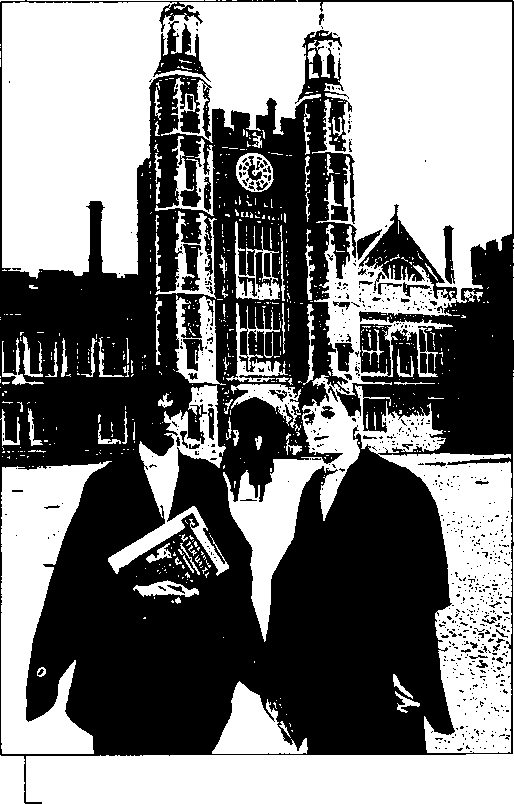

The thing is thаt private schools 1 public in the UK. Why? When only the rich could get education many years ago, special schools 2 for the poor by charities, special organizations collecting money for people in need. As it was public money, such schools 3 public schools. In the course of history they became very successful and turned into expensive private educational establishments, but the conservative Britain continued to call them as earlier.
Public schools* 4 as either all-boys or all-girls now. They can be full boarding, where pupils live the whole academic year except holidays; normal, when students return home every day; and mixed, the pupils there can stay or go home.
The first thing you need know is money as up £ 20 000 a year 5 at some public schools. Only about six per cent of the British can afford them. The grants 6 for bright children but competition is very high. The next point is to belong to the right class as the class system is still very important. So public education is a privilege of the middle and upper classes.
The backbone of the independent educational sector 7 by public schools. The most famous public schools are Eton, Harrow, Rugby. Among several hundred public schools the most famous are the «Clarendon Nine»: Winchester (founded in 1382), Eton (1440), St. Paul's (1509), Shrewsbury (1552), Westminster (1560), the Merchant Taylor’s (1561), Rugby (1567), Harrow (1571), Charterhouse (1611).
The golden age of the public schools 8 in the end of the 19th century. They were vital to establishment of a particular outlook and set values by the dominant professional classes. Its emphasis 9 on the making of gentlemen to enter one of the professions: law, medicine, the Church, the civil service or colonial service. A career in commerce, or «mere man making» 10.
Many parents want to send their children to public schools. These schools have special register lists. Eton maintains two lists: one for children of «old boys» (their leavers) and the other for outsiders. But such schools are careful not to expand to meet demand.
This rush to private education is despite the steep rise in fees. In order to obtain a place in a public school, children must take a competitive examination, called «Common Entrance». In order to pass it, most children destined for a public school education attend a preparatory (or а prep') school until the age of 13. Most candidates have to attend an interview, do well at primary school and pass a test.
________________________________________________________________________________
* См.: Раздел VI Глоссарий «Социокультурной портрет Великобритании»
A
public school
«паблик скул» - привилегированная
частная средняя школа закрытого типа,
не зависящая от местных органов
образования, для детей из средних/высших
слоев общества
To be funded for the poor by charities финансироваться на деньги от благотворительности
To turn into expensive private educational establishments превратиться в образовательные учреждения с высокой платой за обучение
All-boys/all-girls/full boarding/normal/mixed schools только для мальчиков/только для девочек/интернаты/стандартные/смешанного типа школы
To charge назначать цену
To afford позволять
A grant for bright children грант/дотация/субсидия для одаренных детей
A privilege of the middle and upper classes преимущественное право/привилегия для представителей среднего и высшего классов общества
A backbone основа
Making of gentlemen to enter one of the professions: law, medicine, the Church, the civil service or colonial service. Bоспитание джентльмена и овладение профессиями: юриспруденцией, медициной, поступление на церковную, государственную и колониальную службу
«Common Entrance» вступительный экзамен в частную среднюю школу закрытого типа

-
a) be called b) were called c) are called
-
а) are funded b) were funded c) will be funded
-
a) were named b) were being named c) had been named
-
a) are run b) are being run c) had been run
-
a) is charged b) are charged c) were charged
-
a) are set b) were set c) will be set
-
a) had been formed b) are formed c) is formed
-
a) is marked b) was marked c) is being marking
-
a) was put b) was being put c) had been put
-
a) is considered b) was considered c) was not considered
